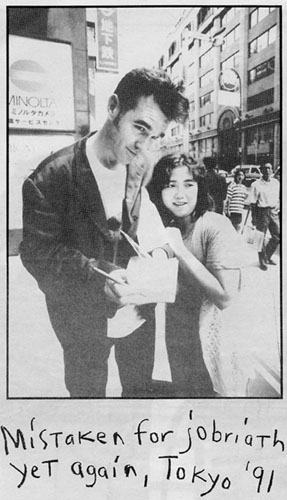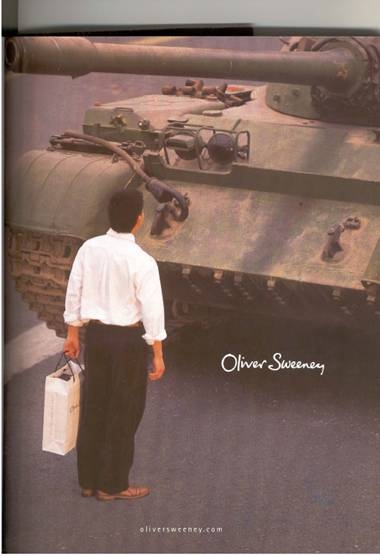 Fahrenheit 451 (Dir: Francois Truffaut, 1966)
Fahrenheit 451 (Dir: Francois Truffaut, 1966)Someone once told me, probably in a pub, that he distrusted intellectuals, especially writers, because they get so angry at the notion that the Nazis burned books. When you consider that they burned quite a few people as well, he argued, isn't the incineration of a few tons of woodpulp a minor detail? The counter-argument is that if someone had stepped in when the Brownshirts were torching Heine and Mann, the Holocaust (of humans) might have been prevented. By the same (book) token, if someone had had the
cojones in 1989 to tell people to stop
burning copies of The Satanic Verses, a whole pile of grief might have been prevented. Or maybe not.
The Nazi book-burnings were an obvious inspiration to Ray Bradbury when he penned
Fahrenheit 451, but the context in which he places his 'firemen' is a plausibly benevolent dictatorship, and Truffaut maintains this scenario. Sure, there are compulsory haircuts, and a mysterious war going on somewhere off-screen, but the unnamed state is clearly closer to contemporary suburbia than to the Third Reich. Which, of course, is the whole point; we can't complain about a dictator if he's ruling by general consent, even if that consent is passive.
Montag (Oskar Werner) is a fireman; his job is to burn books. He lives with his wife Linda (Julie Christie) who pops pills and lives for the interactive entertainment piped into their 'wall screen'. When he tells her that he's been offered a promotion, her immediate response is that they can get a second wall screen. Unfortunately for Linda's home cinema dreams, Montag gets to know Clarisse (also played by Christie), an encounter that nudges him into saving the books that he should be destroying, and (uh-oh) reading them.
It's a superficially 'normal' world. People live in detached houses, not faceless, Soviet apartments. There are trees and cafes and playgrounds for the children. Everyone is 'cousin', not 'citizen' or 'comrade'.
Airstrip One this ain't. So the odd touches, the commuter monorail, the funny salutes and handshakes that the firemen give, the obsession with everyone having the backs of their heads photographed (shades of
Magritte?) only appear odder by their incongruity with the 'normal surrounding'. The firemen themselves, a peculiar amalgam of the Gestapo, the French
CRS and the
Trumptonshire Fire Brigade, just look a bit gay. This is reinforced when Montag's off-duty headwear is revealed to be a leather biker cap.
As a piece of entertainment, it's a little stilted. Werner is an unsympathetic hero, shifting from being an unthinking factotum of the state on minute, to a hectoring, holier-than-thou revolutionary the next.
"She cried because it is true!" he snaps after he upsets one of Linda's vacuous friends with his dangerous new ideas. Christie is given little to work with in either role; this dystopic future clearly escapes the influence of feminism. The best performances come from Anton Diffring as Montag's jealous colleague/nemesis, bizarrely doubling as the headmistress of the school from which Clarisse is fired; and Cyril Cusack as their boss, who gets the best lines.
"All this philosophy," he sighs before he incinerates an attic library.
"Let's get rid of it."Truffaut gets his philosophical serve in from the start; the title sequence is done as a voiceover, rather than on-screen text. This is what a book-free life is like, we are to infer. In this deprived environment, the closest thing to books that people have is Montag's text-free comic strip. Which does rather beg the question of how he is able to read
David Copperfield (albeit haltingly) when he turns traitor.
Of course, Truffaut (as Bradbury did before him) loads the dice in his own favour. The TV available on the Montags' wallscreen nothing but inane pap. The books that get destroyed, meanwhile, are mostly 'serious' tomes, Dickens, Thackeray, Cervantes, Flaubert, Genet, Nietzche, Aristotle (although a stray
MAD magazine and, cutely, a copy of
Cahiers du Cinema do get tossed on the pyre as well). When a book-lover chooses to be burned along with her volumes, she intones
the words of the Protestant martyr Bishop Latimer. Are we supposed to give ourselves a little self-congratulatory hug if we spot the reference, because it shows we've probably read a book or two, rather than slobbing out in front of
EastEnders or
Wheel of Fortune?
The problem is that there's no real explanation or even discussion of
why books are more dangerous to an intrusive state than other media. Surely, rather than ban books outright, the authorities could simply produce their own, just as Nazi Germany and the Soviet Union could do. The only state, as far as I recall, that actually took steps to wipe out reading as an intellectual activity was the Khmer Rouge - and they got rid of television as well.

The final scenes of disaffected intellectuals pacing about in the snow, reciting the texts they've memorised to ensure that they survive, are as disturbing as those of the stupefied suburban wives watching the wall-screen. A world run by TV executives is a grisly prospect, but so is a world run by a self-righteous book group. We're back to
Ed Murrow's 'wires and lights'. No medium is 'good' or 'bad' in and of itself; it all depends on the content. Surely a bad book is worse than good TV? Cervantes vs.
Celebrity Love Island is a no-brainer but so, surely, is Dan Brown vs. Dennis Potter. And since
Play For Today has been tapped for revival, getting another wall screen may not be such an indicator of philistinism after all.
 1. The Magnificent Seven (John Sturges, 1960) Before the days of VCRs, my dad taped the soundtrack off the telly on his big old open-reel machine, and we'd sit and listen and act it out. I was usually Robert Vaughn, who doesn't do much, but does it exceedingly coolly. Oh, and it's considerably less looooong than Seven Samurai.
2. Big (Penny Marshall, 1988) The best thing Tom Hanks has ever done, and ever will do.
3. Charade (Stanley Donen, 1963) Everyone thinks this is a Hitchcock film, because it's got Cary Grant in, looking urbane under pressure. Truth is, it's more fun than most of the fat freak's stuff.
4. Hellzapoppin (H.C. Potter, 1941) I laughed so much at this film when I was about eight that I peed on my grandma's living-room carpet. I accidentally-on-purpose spilled some orange squash on it to disguise the fact.
5. Grosse Point Blank (George Armitage, 1997) Assassins have therapists? And unions? Wa-hey!!! Where do I sign?
6. Angel Heart (Alan Parker, 1987) Mickey Rourke before he went mental, De Niro as Satan, and Lisa Bonet does naked. What more on God's Earth could you desire? Oh, and voodoo. And chickens.
7. Pretty in Pink (Howard Deutch, 1986) I had my high school prom the same year, only in Canada we called it a 'formal'. Guess who I identified with (and it wasn't James Spader).
8. Wallace & Gromit in The Curse of the Were-Rabbit (Steve Box & Nick Park, 2005) I agree with the critical consensus that Crash was an undeserving recipient of the Best Picture Oscar. However, I think this was the gay love story that should have got it.
1. The Magnificent Seven (John Sturges, 1960) Before the days of VCRs, my dad taped the soundtrack off the telly on his big old open-reel machine, and we'd sit and listen and act it out. I was usually Robert Vaughn, who doesn't do much, but does it exceedingly coolly. Oh, and it's considerably less looooong than Seven Samurai.
2. Big (Penny Marshall, 1988) The best thing Tom Hanks has ever done, and ever will do.
3. Charade (Stanley Donen, 1963) Everyone thinks this is a Hitchcock film, because it's got Cary Grant in, looking urbane under pressure. Truth is, it's more fun than most of the fat freak's stuff.
4. Hellzapoppin (H.C. Potter, 1941) I laughed so much at this film when I was about eight that I peed on my grandma's living-room carpet. I accidentally-on-purpose spilled some orange squash on it to disguise the fact.
5. Grosse Point Blank (George Armitage, 1997) Assassins have therapists? And unions? Wa-hey!!! Where do I sign?
6. Angel Heart (Alan Parker, 1987) Mickey Rourke before he went mental, De Niro as Satan, and Lisa Bonet does naked. What more on God's Earth could you desire? Oh, and voodoo. And chickens.
7. Pretty in Pink (Howard Deutch, 1986) I had my high school prom the same year, only in Canada we called it a 'formal'. Guess who I identified with (and it wasn't James Spader).
8. Wallace & Gromit in The Curse of the Were-Rabbit (Steve Box & Nick Park, 2005) I agree with the critical consensus that Crash was an undeserving recipient of the Best Picture Oscar. However, I think this was the gay love story that should have got it.
 9. Crouching Tiger, Hidden Dragon/Wo hu cang long (Ang Lee, 2000) What you're supposed to say: "It's Chinese cinema made digestible for Western audiences." What I say: a) Ziyi Zhang is very pretty, and; b) "I would rather be a ghost drifting by your side as a condemned soul than enter heaven without you. Because of your love, I will never be a lonely spirit." ...sob...
10. Trading Places (John Landis, 1984) If only for the 'BLT' scene, when Eddie Murphy looks at the camera. You know the one.
Patroclus, Slaminsky, Curve. You be tagged. Scoop up this wad of cinematic Play-Do and mould it into something fine.
9. Crouching Tiger, Hidden Dragon/Wo hu cang long (Ang Lee, 2000) What you're supposed to say: "It's Chinese cinema made digestible for Western audiences." What I say: a) Ziyi Zhang is very pretty, and; b) "I would rather be a ghost drifting by your side as a condemned soul than enter heaven without you. Because of your love, I will never be a lonely spirit." ...sob...
10. Trading Places (John Landis, 1984) If only for the 'BLT' scene, when Eddie Murphy looks at the camera. You know the one.
Patroclus, Slaminsky, Curve. You be tagged. Scoop up this wad of cinematic Play-Do and mould it into something fine.
























